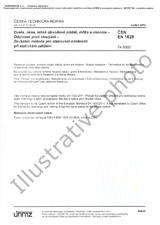We need your consent to use the individual data so that you can see information about your interests, among other things. Click "OK" to give your consent.
ČSN P CEN ISO/TS 19590 (012017)
Nanotechnologies - Size distribution and concentration of inorganic nanoparticles in aqueous media via single particle inductively coupled plasma mass spectrometry
Translate name
STANDARD published on 1.9.2019
The information about the standard:
Designation standards: ČSN P CEN ISO/TS 19590
Classification mark: 012017
Catalog number: 507515
Note: WITHDRAWN
Publication date standards: 1.9.2019
SKU: NS-969260
The number of pages: 32
Approximate weight : 96 g (0.21 lbs)
Country: Czech technical standard
Category: Technical standards ČSN
Preview of the standard ČSN P CEN ISO/TS 19590 (012017)
We recommend:
Technical standards updating
Do you want to make sure you use only the valid technical standards?
We can offer you a solution which will provide you a monthly overview concerning the updating of standards which you use.
Would you like to know more? Look at this page.




 Cookies
Cookies
